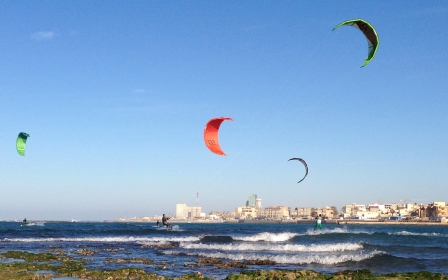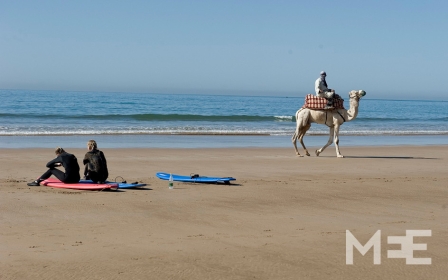Climbing community scales new heights in West Bank
EIN QINYA, West Bank - In rock climbing jargon, they call it “pebble wrestling”. With the help of three spotters, Dima, a first-time rock climber, is wrestling her way to the top of a large boulder outside Ein Qinya, a small village near Ramallah, in the midday sun.
Her spotters are fellow climbers, also newbies to the sport, who are there to make sure that if Dima falls, she falls safely and comfortably onto the padded mats beneath her. They also guide Dima up the small rock face, recommending “solutions” - or routes - over the boulder.
“I feel great. I feel accomplished, even though I think I might have hurt my hand a little,” says an animated Dima after reaching the top. What made Dima want to try climbing? “I wanted to come for the adventure,” she told Middle East Eye. She said she has a hunch that “Palestinians love adventure".
In July 2014, two young climbing enthusiasts from the US moved to the West Bank with an ambitious and unprecedented goal: to start a rock climbing community in Palestine.
“The end vision for us in Palestine is to have an indoor climbing gym with an active outdoor community that uses the outdoor locations we’re developing,” says Wadi Climbing co-founder Tim Bruns. “But basically, we want to help grow a community in Palestine that goes rock climbing.
“When we came to the West Bank,” co-founder Will Harris told MEE, “we saw this huge lack of recreational opportunities, but a lot of great outdoor culture and potential. We just wanted to see if it was possible to build this indoor gym and develop a climbing community.”
Wadi Climbing has already developed at least two outdoor climbing locations with the support of the Palestinian communities near their locations, Ein Qinya and Yabrud, both outside Ramallah. But plans are underway for an indoor climbing gym in Ramallah too, which will be designed and built by Wadi’s American partners.
“The indoor gym by itself is not the priority,” says Bruns, “but what it represents is having established a climbing community..."
“A community of people who are interested in the outdoors, alternative fitness, health, recreation and different things to do for fun. The gym will be a hub for this community to congregate,” added Harris.
Already, would-be climbers are flocking from around Palestine - from Nablus in the north to Bethlehem in the south and Jerusalem - to try their hands at the sport.
Since Wadi Climbing started leading climbing trips in the Palestinian countryside in January, the organisation has introduced at least 450 new climbers to the sport. An easy majority of these are Palestinian, with a few experienced internationals also discovering the sporting opportunities Palestine has to offer. Almost half of Wadi’s new climbers are women.
Harris and Bruns have developed a multi-day training programme for new climbers, during which they instruct them in the basics of rock climbing safety, knot-tying, and belaying. Marina from Jerusalem says she’ll definitely be back to take the test, pass the course and get her certificate. Looking up at the rock face in front of her, she says she is “excited, not afraid”.
Nassar from Ramallah is a recent graduate of the Wadi Club, a month-long training programme exclusively offered to Palestinian climbers keen to develop their fitness alongside their climbing skills.
“Climbing is a new thing in Palestine, but we’re creating a great community already. Everyone has become friends. On a climbing trip, as soon as everyone memorises each other's names, you become a family,” Nasser says, smiling enthusiastically.
The group of Palestinian climbers Nasser graduated with still meets to climb regularly. “We knew everyone was going to keep climbing, so we thought, why not keep climbing together?”
“Within the last couple of weeks,” recounts Bruns, “we’ve noticed that beyond the umbrella of Wadi Climbing, climbers are visiting and practicing on the locations we’ve developed. Some of the Palestinian climbers we helped train are connecting with international climbers here.
“This is a huge success for us. We can’t single-handedly build a climbing community. It has to be led people who are passionate about climbing,” he added.
Wadi’s organisers are actively pursuing partnerships with local Palestinian businesses and NGOs, too, including Pal-Fit - a new crossfit gym in Ramallah - and Right to Movement, an international running organisation with branches in the West Bank and local health food shops. Wadi Club members are encouraged to run along with Right to Movement’s regulars.
A goal of Wadi Climbing is to encourage more Palestinian and international climbers to explore Palestine’s sometimes brilliantly rocky topography. A consensus among the first-time climbers at Ein Qinya is that they don’t explore rural Palestine enough.
“I don’t come to places like this very often,” says Marina. “Palestine is beautiful, but it’s hard to come and see these parts of the country unless you have a reason.” Mona from Nablus, still outwardly pleased after completing her first climb, says, “It’s nice to be in nature, to be refreshed.”
There are, however, limited areas within the West Bank where Palestinians are allowed to climb and where Wadi’s organisers are permitted to develop new climbing routes.
More than 60 percent of the West Bank, known as Area C, is under full Israeli civil and military control. Building and infrastructural development in Area C falls under the jurisdiction of Israel’s civil administration, which has full control over all zoning and planning requests. In practice, the civil administration grants almost no permits to Palestinian-led building initiatives in Area C.
So far, Wadi Climbing’s outdoor locations have been developed in areas under the jurisdiction of the Palestinian Authority, Areas A and B. Whether Israeli climbers use the locations developed by Wadi depends on if they have permission to enter the West Bank under Israeli law.
“What we’re creating is a public place, where, theoretically, anyone who has their own climbing gear can get involved,” says Harris. “If you have the necessary experience and the necessary gear, anyone can go and climb.”
“Another of our goals,” he adds, “is to make these sites available and accessible to the community of Palestinian climbers which we hope will keep growing.”
As Wadi Climbing pursues the final installment of investment needed to complete Ramallah’s indoor climbing gym, Harris and Bruns are confident investors, both local and international, will see the project as viable. Already, a majority of funding for the project has been raised. Most of this is Palestinian money committed by the Palestinian Investment Fund.
“Eleven months ago we were telling people we had plans to build a climbing gym in Ramallah. They’d say, ‘Oh, great idea,’ with some disbelief. But we’ve created some local interest now and the beginnings of a community. We’ve brought close to 500 people climbing, and for investors, what matters is that people are actually paying to climb,” say Bruns.
The future of climbing in Palestine is bright, say Bruns and Harris. If all goes according to their plan, they’ll have accomplished their goal of creating a climbing community in the region when they are a surplus to that community’s requirements.
“The plan, particularly for the climbing gym, is not that we run it for four years, and then we go away. No way. We want - and we know it’ll take work to get there - we want the project to eventually be transferred to local management, and we want the community to be self-sustaining.”
Stay informed with MEE's newsletters
Sign up to get the latest alerts, insights and analysis, starting with Turkey Unpacked
Middle East Eye delivers independent and unrivalled coverage and analysis of the Middle East, North Africa and beyond. To learn more about republishing this content and the associated fees, please fill out this form. More about MEE can be found here.








